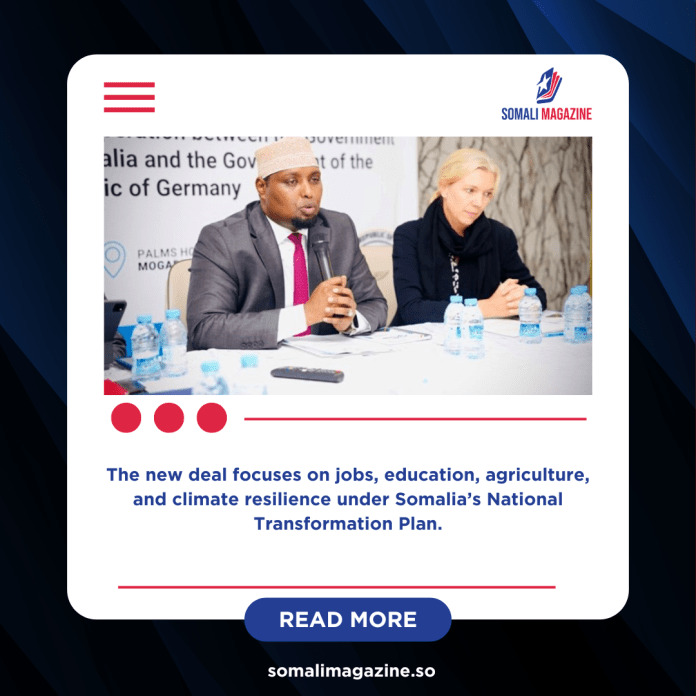Facebook Twitter (X) Instagram Somali Magazine - People's Magazine
The Somali government has signed a €75 million development cooperation agreement with Germany to boost national growth and strengthen key sectors that support livelihoods across the country. The deal was formalized on Wednesday in Mogadishu by Somalia’s Minister of Planning, Investment and Economic Development, Mahmud A. Sheikh Farah (Beenebeene), and Julia Hanning, Head of the East Africa Department at Germany’s Federal Ministry for Economic Cooperation and Development (BMZ).
This new partnership is part of Germany’s ongoing support for Somalia’s National Transformation Plan (NTP 2025–2029), which focuses on building a stronger and more self-reliant economy. The funding will be directed toward vital areas including agriculture and food systems, education, employment creation, technical and vocational training, water and irrigation management, and climate change resilience. The agreement builds upon an earlier cooperation framework signed in 2023, which laid the foundation for continued collaboration between the two nations.
Over two days of discussions held in Mogadishu, Somali and German officials reviewed progress from previous projects and mapped out the next phase of cooperation. Both sides reaffirmed their commitment to ensuring that development programs produce tangible, long-term results for Somali communities.
Minister Beenebeene expressed his appreciation for Germany’s continued partnership, saying the new agreement aligns closely with Somalia’s development priorities under the National Transformation Plan. “This partnership reinforces our national goals, particularly in job creation, access to basic services, and building climate resilience,” he said. He added that Somalia’s development vision depends on strong international collaboration and the effective use of resources to support communities at all levels.
Julia Hanning, representing the German government, emphasized Berlin’s long-standing support for Somalia’s development journey. She said Germany remains committed to promoting initiatives that improve service delivery, expand job opportunities, and foster inclusive economic growth. “Somalia and Germany share more than 60 years of friendship and cooperation,” Hanning said, noting that the two countries’ partnership has always been based on mutual respect and shared values. She highlighted Germany’s belief that sustainable development can only be achieved when people are empowered through education, skills, and access to essential services.
The €75 million agreement marks a significant step forward in Somalia’s efforts to achieve economic stability and national transformation. It underscores Germany’s role as a key partner in supporting governance reforms, infrastructure development, and environmental sustainability. By investing in areas such as education and vocational training, the initiative aims to create employment opportunities for Somalia’s growing youth population. Additionally, funding for agriculture and water management projects is expected to enhance food security and help communities adapt to the impacts of climate change.
The collaboration also reflects Somalia’s broader strategy to work closely with international partners in driving progress toward long-term peace, stability, and development. With support from Germany and other allies, Somalia hopes to strengthen its institutions, expand its economic base, and build a more resilient society capable of withstanding future challenges.
As both governments reaffirm their shared commitment, the agreement stands as a symbol of hope and renewed cooperation—one that looks beyond immediate needs and focuses on lasting transformation for the Somali people.

